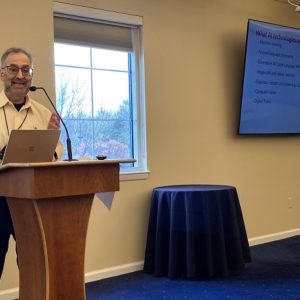At SheTek Conference, Advice to Women Seeking Careers in Tech
Three dynamic New Jersey women — Judith Sheft, Gale Tenen Spak and Katherine Kish — who have been on the forefront of education, tech innovation, entrepreneurship and the future of work for most of their careers, spoke at the SheTek Virtual Conference on July 23.
During their session, which Sheft moderated, they discussed the value of nontraditional continued learning for tech careers and beyond.
SheTek is a Princeton-based initiative of PamTen, a woman-led IT enterprise-solutions, professional-staffing and cybersecurity-services firm. PamTen, also based in Princeton, formed SheTek to address the need to boost the percentage of women in the technology industry.
According to the SheTek website, the “SheTek Community supports a pipeline of talent that is highly skilled and job ready. This unique community is powered through partnerships and collaborations to provide training, mentorship and internships that lead to job placements through SheTek Staffing Services.”
Both Sheft and Spak have university backgrounds. Sheft, formerly associate vice president for strategic relationships and external affairs at NJIT, is now executive director of the New Jersey Commission on Science, Innovation and Technology. Spak is now president of Bridge Their Future (Aberdeen), and was formerly associate vice president for continuing and distance education at NJIT. Kish is the executive director of Einstein’s Alley, a Princeton-area private, nonprofit economic-development organization that has been focusing on the future of work for the last several years.
Spak: The 60-Year Curriculum
Spak gave some perspective on what used to be called “lifelong learning” from a university’s point of view.
She said that universities are now looking at an initiative called the “60-Year Curriculum,” which is based on the view that universities should serve people over a period of 60 years of their lives. “It’s not just a new name for continuing ed,” which is often treated as the “stepchild” of a university, she said. It represents a real change.
Universities will be expected to incorporate certificate courses, micro courses, earned badges, and courses taken online from free universities. And they will need to come up with new ideas for making continuing education fit learners over a 60-year time span. The 60-Year Curriculum will feature portable transcripts, for instance, and only some of the time spent by learners will part of a four-year degree program.
To achieve that 60-year fit, there will also be changes in the way career services operates, said Spak. “Every college has an Office of Career Services, which typically becomes the most active when rising juniors and rising seniors realize, ‘Oh my God, I need to get a job.’ And that’s when they start interacting with that office in their college. In the 60-Year Curriculum, career services will start in the freshman year of college, so [the students] can relate what’s being taught to jobs needed in their local community.”
Kish: You Are in Charge of Your Own Learning Opportunities
According to Kish, people could be buying education like a retail product, in the same way they would buy a new dishwasher. Spak had referred to research showing that Gen Z workers wanted their employers to provide learning opportunities. To that, Kish replied, “I’m of the mindset that you’re in charge of your own life, your own career. You are your own strategy officer. You are your own leadership” counselor. “And you’ve got to be thinking of how you want to direct your life.”
She noted that, as executive director of Einstein’s Alley, she had been presenting programs about the future of work for many years, and she has heard predictions and theories put forth only four years ago that are coming true today. She added that she believes remote work will continue, and that the world may be moving to a four-day workweek. That will give people the opportunity to “move time around,” and you’ll “really be in charge of your life in a different way.”
Kish added that when work is so changeable and people are moving between employers so frequently, “you don’t want to be getting your healthcare from your employer. That’s very dangerous in a time when we’re going to have multiple jobs, and are going to work for multiple corporations.”
Sheft: Finding Learning Opportunities
Sheft noted that, with all the learning activity that people are engaging in, they may have to be taught how to learn, so they can control their own learning activities. Spak had mentioned earlier that we all don’t learn in the same way, and that students aren’t necessarily doing well with remote learning. In response, Sheft said that the question is how to create either a hybrid model or some kind of mentorship for students. “So, multiple modalities are important, and I think being able to be guided in learning techniques is a very important point.”
Sheft asked the panelists what advice they would have for someone who says, “Hey, I really believe I’m missing this skill. I want to learn project management,” or “I want to learn how to give better presentations” or “I want to learn personal branding.” She was looking for advice about how to figure out which activity people should focus on to ensure that they’re spending their time and their money on skills that industry is going to value.
Kish said that you want to go to legitimate sources for that kind of learning, and she recommended the community colleges in New Jersey. “They’ve really stepped up to guide learners.” Her point was to stick with trusted brands before going out into the “Wild West” of education.
Spak had also said that the labor departments of each state, including New Jersey’s, which is the Department of Labor & Workforce Development, are really into data analysis now. They know what kinds of companies are in each county and each town in their states, along with what kinds of employees they are looking for. And they often encourage companies to provide descriptions of their job openings in terms of the skills needed., she said. So, you should see what kinds of programs your state’s labor department is putting forward. In fact, it may even fund your education in areas where employees are needed, such as healthcare and manufacturing, she said.




